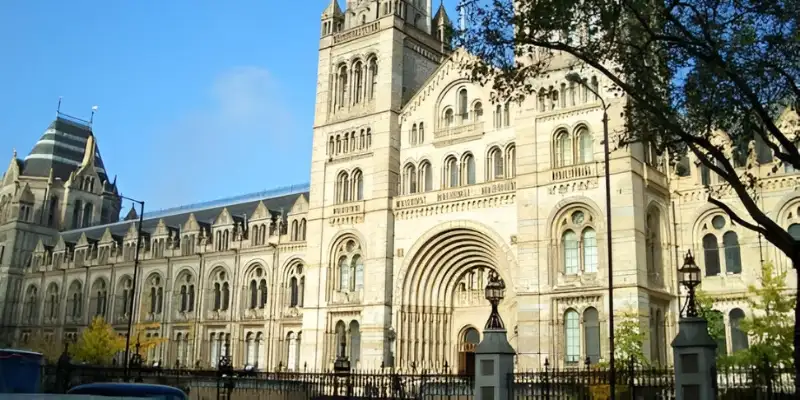Imperial College London Campus
Imperial College London has multiple campuses in central and west London, each of which is intended to foster excellence in research and a particular discipline. These campuses are ideally situated to provide students with access to state-of-the-art facilities, international industrial networks, and a bustling urban environment.
With multiple specialised campuses spread around central and west London, Imperial College London provides students with top-notch resources, facilities, and opportunities that are targeted to particular fields.
South Kensington Campus
South Kensington, the main campus of Imperial College London, is well known for emphasising STEM research and education. Situated in the centre of London’s museum area, it has state-of-the-art labs, lecture halls, libraries, and dorms for students.
Because of its closeness to international intellectual and cultural organisations, it serves as a centre for creativity and cooperation.
- Popularity: Flagship campus renowned for multidisciplinary research and outstanding STEM education.
- Special Qualities: is flanked by establishments like the Royal Albert Hall and the Natural History Museum, and it contains the main library and state-of-the-art labs.
- Location: South Kensington in Central London, which provides easy access to transport, cultural sites, and facilities for students.
White City Campus
Imperial’s hub for biotechnology, artificial intelligence, and entrepreneurial research is located on this site. Known for supporting tech companies and innovation, it includes the Translation & Innovation Hub (I-HUB) and the Imperial White City Incubator. It links students with top venture investors and up-and-coming industries in west London.
- Popularity: renowned for entrepreneurship, biotech, and artificial intelligence innovation.
- Special Features: Supports research spinouts and companies and is home to the Imperial White City Incubator and I-HUB.
- Location: West London; conveniently located near burgeoning tech hubs and easily accessible by the Overground and Tube.
Hammersmith Campus
Hammersmith Campus, which houses Imperial’s Clinical Research Facility and cutting-edge labs, is primarily devoted to postgraduate medical research and clinical education. It is essential to translational medicine, cardiovascular research, and cancer research. Its location facilitates direct cooperation with healthcare partners and NHS hospitals.
- Popularity: Well-known for its contributions to postgraduate clinical education and medical research.
- Specialities: Translational medicine, oncology, and cardiovascular disease are prioritised; the Imperial Clinical Research Facility is located there.
- Location: West London, close to hospital facilities and NHS research facilities.
Charing Cross & Chelsea and Westminster Hospitals
Imperial’s medical students receive clinical training on these campuses. They are well-known for giving students practical hospital experience, enabling them to work closely with patients while being supervised by leading medical experts. Exposure to a variety of healthcare settings and specialities is guaranteed by their central London location.
- Popularity: Crucial clinical training facilities for aspiring doctors.
- Special Features: Offer practical experience in authentic hospital environments while being supervised by highly qualified medical professionals.
- Location: Central London; part of the NHS network in London, offering access to a wide range of patients.
Royal Brompton Campus
The Royal Brompton Campus, which specialises on heart and lung disorders, fosters world-class cardiothoracic medical research and education. It provides access to highly specialised clinical settings in west London and is intimately linked with Imperial’s National Heart and Lung Institute and NHS care.
- Popularity: Known across the world for training and research on the heart and lungs.
- Specialities: Provides exposure to cutting-edge cardiac care through its affiliation with the National Heart and Lung Institute.
- Location: West London; conveniently located inside a specialised NHS hospital.
St Mary’s Campus
The Faculty of Medicine and Imperial’s medical school headquarters are located on St. Mary’s Campus, which serves as a centre for biomedical research. It is situated in Paddington and houses one of London’s main teaching hospitals, giving students experience in emergency medicine and urban healthcare dynamics.
- Popularity: Important location for medical education and biomedical research.
- Special Features: Supports trauma and emergency medicine facilities, contemporary teaching labs, and medical school administration.
- Location: Paddington, Central London; next to the important teaching hospital, St. Mary’s Hospital.
Silwood Park Campus
Imperial’s campus for ecology, evolution, and environmental science is called Silwood Park, and it is located in Berkshire, outside of London. In a more rural university setting, it provides research labs, residential housing, and access to extensive natural ecosystems for fieldwork.
- Popularity: Well-known for ecology, evolutionary biology, and environmental sciences.
- Special Features: Provides extensive natural habitats and field stations for MSc programs and hands-on research.
- Location: A serene rural campus with residential amenities and abundant wildlife in Berkshire, outside of London.
North West London Hospitals
Imperial’s medical students have access to extended clinical training and internships through this network of associated facilities. These hospitals offer specialised treatment and serve a variety of communities, providing students with a broad range of clinical exposure across the greater London area. Due to their central and west London locations, all campuses offer convenient access to public transport, cultural attractions, and facilities for students.
- Popularity: A component of Imperial’s extensive clinical network offering experiential learning opportunities for students.
- Special Features: Partnerships with general and speciality hospitals provide exposure to a variety of healthcare providers.
- Location: Greater London area; supports a multicultural patient group and is reachable from key campuses.



